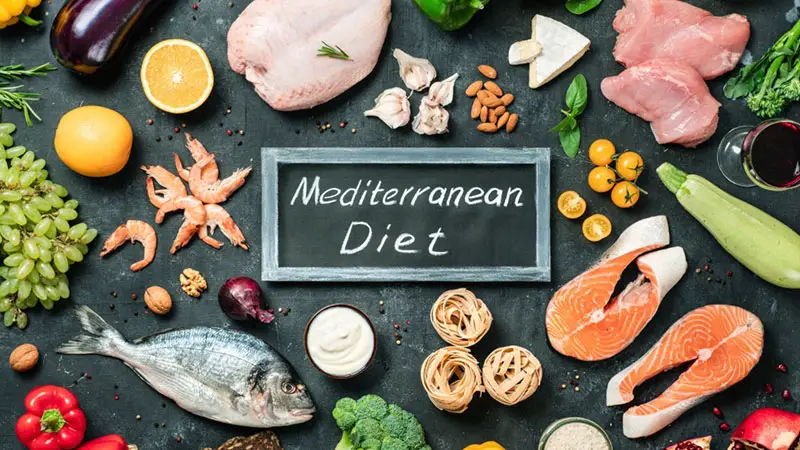The Mediterranean diet, often hailed as one of the healthiest eating patterns, draws inspiration from the traditional cuisines of countries bordering the Mediterranean Sea.
It’s not just a diet but a lifestyle that emphasizes whole foods, balanced nutrition, and the enjoyment of meals.
This approach has garnered attention for its potential to improve heart health, support weight management, and enhance overall well-being.
Rooted in the culinary traditions of Greece, Italy, and Spain, the Mediterranean diet prioritizes fresh fruits, vegetables, whole grains, and healthy fats like olive oil.
It encourages the consumption of fish and poultry while limiting red meat and sweets. With its rich flavors and diverse ingredients, the Mediterranean diet offers a delicious and nutritious way to nourish the body and mind.

What Is the Mediterranean Diet?
The Mediterranean diet, first outlined by Ancel and Margaret Keys in 1975, is a dietary pattern inspired by the traditional eating habits of Southern Spain, Southern Italy, and Crete.
This diet emphasizes whole foods and balanced nutrition. Key components include fresh fruits, vegetables, whole grains, legumes, nuts, and seeds. Healthy fats, mainly from olive oil, play a crucial role, while red meat and sweets are limited.
Seafood, particularly fish high in omega-3 fatty acids, features prominently in the Mediterranean diet. This dietary pattern promotes moderate consumption of dairy, mainly in the form of cheese and yogurt. Red wine is also included in moderation, often enjoyed with meals.
Research supports the Mediterranean diet’s benefits for heart health, weight management, and overall well-being. Studies indicate that adherence to this diet can reduce the risk of cardiovascular diseases, improve metabolic health, and support longevity.
The Mediterranean diet stands out for its enjoyable and sustainable approach to healthy eating, encouraging individuals to savor their food and make thoughtful dietary choices.
Benefits of the Mediterranean Diet

The Mediterranean diet offers numerous health advantages that contribute to long-term well-being. Below are some key benefits.
Heart Health
The Mediterranean diet significantly improves heart health. Studies show it reduces the risk of cardiovascular disease by 25% to 30%.
This diet emphasizes fruits, vegetables, whole grains, and healthy fats like olive oil. These foods help lower bad cholesterol (LDL) and increase good cholesterol (HDL).
Omega-3 rich seafood also plays a crucial role in maintaining heart health by reducing inflammation and improving overall heart function.
Weight Management
Adopting the Mediterranean diet aids weight management. Research indicates that people following this diet experience better weight control compared to those on low-fat diets and they often have lower body mass indexes (BMIs).
The focus on whole foods, lean proteins, and healthy fats keeps hunger at bay and promotes a feeling of satiety. This helps individuals avoid overeating and maintain a healthier weight.
Brain Health
The Mediterranean diet promotes brain health and reduces cognitive decline. Evidence suggests that this diet lowers the risk of Alzheimer’s disease and other forms of dementia by up to 40%.
Nutrients such as omega-3 fatty acids, antioxidants, and polyphenols found in this diet support brain function and protect against neurodegenerative diseases. Regular consumption of these nutrients enhances memory, mood, and overall cognitive performance.
The Mediterranean diet exemplifies a holistic approach to health, incorporating heart, weight, and brain benefits into a sustainable lifestyle for lasting well-being.
Foods to Include

The Mediterranean diet prioritizes various nutrient-rich foods. It’s centered around natural ingredients that offer numerous health benefits.
Fruits and Vegetables
Fruits and vegetables form the cornerstone of the Mediterranean diet. They provide essential vitamins, minerals, and fiber. Examples include tomatoes, spinach, kale, oranges, and berries. Consuming a variety of colors ensures a wide range of nutrients.
Whole Grains
Whole grains are another key component. They offer sustained energy and essential nutrients like B vitamins and iron. Examples are whole wheat bread, quinoa, barley, and oats. These grains are less processed, retaining more nutritional value than refined grains.
Healthy Fats
Healthy fats are predominantly sourced from olive oil, nuts, and seeds. Olive oil is particularly noted for its monounsaturated fats, which benefit heart health. Almonds, walnuts, chia seeds, and flaxseeds offer omega-3 fatty acids, beneficial for inflammation reduction.
Lean Proteins
Lean proteins play a critical role. This includes fish, poultry, legumes, and dairy in moderation. Examples are salmon, chicken, lentils, and yogurt. Fish, rich in omega-3 fatty acids, supports heart and brain health, while plant-based proteins provide additional fiber.
Wine in Moderation
Wine, particularly red wine, is often enjoyed in moderation. It can support heart health due to antioxidants like resveratrol. Typically, moderation is defined as one glass per day for women and two for men.
Foods to Limit or Avoid

Processed Foods: Processed foods, such as snacks, sugary drinks, and convenience meals, lack essential nutrients. These items often contain high levels of unhealthy fats, sugars, and sodium, which can increase the risk of cardiovascular diseases and metabolic disorders.
Refined Grains: Refined grains, such as white bread, white pasta, and pastries, lose fiber and nutrients during processing. Their high glycemic index can lead to blood sugar spikes, contributing to weight gain and diabetes.
Red and Processed Meats: Red meats, like beef and pork, and processed meats, such as bacon and sausages, should be limited. These meats often contain high levels of saturated fats and preservatives linked to heart disease and cancer.
Added Sugars: Items high in added sugars, including candies, desserts, and sweetened beverages, offer empty calories. Excessive sugar intake contributes to weight gain, insulin resistance, and increased risk of type 2 diabetes.
Trans Fats: Trans fats, found in margarine, fried foods, and many packaged snacks, are harmful. They increase bad cholesterol (LDL) and lower good cholesterol (HDL), heightening the risk of heart disease.
Alcohol: While moderate red wine intake is part of the Mediterranean diet, other alcoholic beverages should be limited. Excessive alcohol consumption can lead to liver disease, hypertension, and various cancers.
Butter and Cream: Butter and cream, rich in saturated fats, should be consumed sparingly. They can elevate bad cholesterol levels and increase the risk of cardiovascular diseases.
By limiting these foods, individuals can maximize the health benefits of the Mediterranean diet, promoting overall well-being and longevity.
Creating a Mediterranean Diet Meal Plan

The Mediterranean diet offers a variety of delicious and nutritious options. Planning meals can be simple and enjoyable when focusing on fresh and wholesome ingredients.
Breakfast Ideas
Breakfast, the day’s kickstarter, can include:
- Greek Yogurt with Fresh Fruit and Honey: Combine Greek yogurt, berries, and a drizzle of honey.
- Whole Grain Toast with Avocado and Tomatoes: Spread mashed avocado on whole grain toast, topped with sliced tomatoes.
- Overnight Oats with Nuts and Seeds: Mix oats with almond milk, chia seeds, and a handful of nuts. Refrigerate overnight.
Lunch Options
Lunch should be satisfying and balanced:
- Quinoa Salad with Vegetables and Feta: Combine cooked quinoa, chopped cucumbers, tomatoes, bell peppers, and feta cheese. Drizzle olive oil and lemon juice.
- Grilled Chicken with Mixed Greens: Serve grilled chicken breast on a bed of mixed greens, with a side of olives and a light vinaigrette.
- Lentil Soup with Whole Grain Bread: Prepare lentil soup using red lentils, carrots, onions, and celery, seasoned with herbs. Serve with a slice of whole grain bread.
Dinner Recipes
Dinner time invites creative and wholesome combinations:
- Baked Salmon with Asparagus: Bake salmon fillets with a side of asparagus, seasoned with olive oil, garlic, and lemon zest.
- Vegetable Stir-Fry with Brown Rice: Stir-fry a mix of vegetables like bell peppers, zucchini, and mushrooms in olive oil. Serve over brown rice.
- Stuffed Peppers with Ground Turkey and Quinoa: Fill bell peppers with a mixture of ground turkey, quinoa, and Mediterranean spices. Bake until tender.
Snack Suggestions
Snacks can keep you energized between meals:
- Hummus and Raw Veggie Sticks: Pair hummus with carrot, cucumber, and bell pepper sticks.
- Mixed Nuts and Dried Fruit: Create a mix of almonds, walnuts, raisins, and unsweetened dried cranberries.
- Olives and Cherry Tomatoes: Combine olives with cherry tomatoes for a quick, savory snack.
Creating a Mediterranean diet meal plan focuses on using fresh, nutrient-dense foods. Incorporate these ideas to enjoy flavorful and healthy meals throughout the day.
Frequently Asked Questions (FAQs)
The Mediterranean diet, known for its nutritional benefits and delicious meals, often raises questions. Below are answers to the most common inquiries about this diet.
What are the main foods in a Mediterranean diet?
The Mediterranean diet emphasizes whole foods. It includes plenty of fruits, vegetables, whole grains, beans, nuts, and seeds. Healthy fats like olive oil are staples. Seafood, rich in omega-3 fatty acids, features prominently. Dairy is consumed in moderation, often as yogurt or cheese. Meals are complemented with herbs and spices rather than salt.
What foods are not allowed on a Mediterranean diet?
Certain foods are limited or avoided on a Mediterranean diet. Processed foods, refined grains, and added sugars are restricted. Red and processed meats are minimized. Trans fats, found in many commercially baked goods, and excessive alcohol are discouraged. Butter and cream intake is also limited.
Can you eat eggs on the Mediterranean diet?
Eggs can be included in the Mediterranean diet. They provide a good source of protein and essential nutrients. However, eggs are typically consumed in moderation, often as part of a balanced meal that includes vegetables and whole grains.
What can you drink on a Mediterranean diet?
The primary beverage in the Mediterranean diet is water. Herbal teas are also common. Red wine is consumed in moderation, usually with meals. Coffee can be enjoyed, but without added sugar or cream.
What is a typical Mediterranean lunch?
A typical Mediterranean lunch includes balanced and hearty components. Options include quinoa salad with vegetables and feta cheese or a Mediterranean wrap with hummus, grilled chicken, and mixed greens. Vegetable soups and whole grain bread are also common choices.
Is the Mediterranean diet good for PCOS?
Research indicates that the Mediterranean diet may benefit individuals with PCOS. Its emphasis on whole foods, healthy fats, and lean proteins can help manage insulin levels, reduce inflammation, and support hormonal balance. Always consult with a healthcare provider for personalized advice.
Conclusion
The Mediterranean diet offers a sustainable and enjoyable way to improve overall health and well-being.
Its focus on whole foods, healthy fats, and balanced nutrition makes it a practical choice for those looking to enhance their diet.
By limiting processed foods and embracing fresh, nutrient-dense options, individuals can experience the numerous benefits associated with this diet.
Adopting Mediterranean-inspired meals can lead to a more fulfilling and health-conscious lifestyle.
Moreover, research shows that this diet can reduce the risk of chronic diseases such as heart disease and diabetes. Incorporating plenty of fruits, vegetables, lean proteins, and healthy fats creates a balanced and delicious eating pattern.
